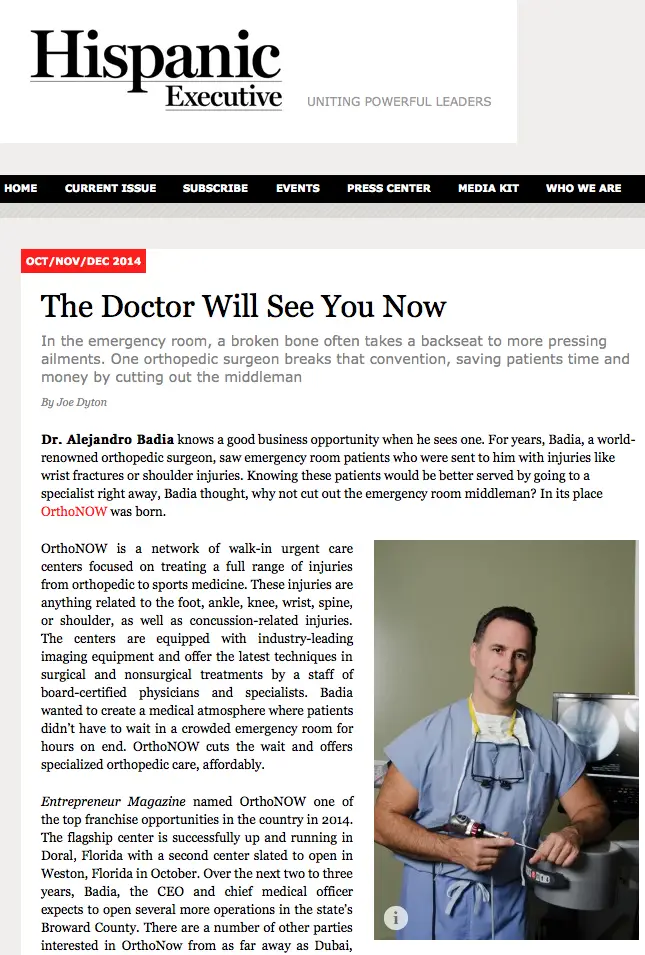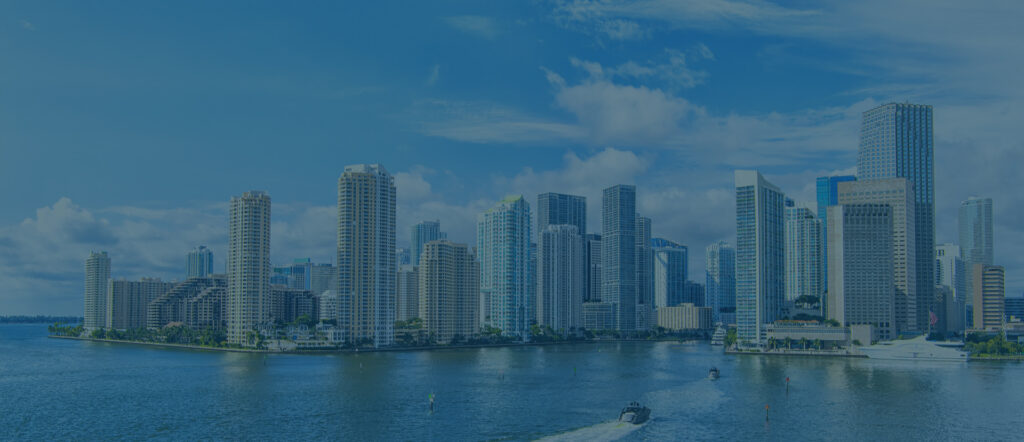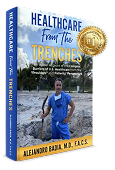
In the emergency room, a broken bone often takes a backseat to more pressing ailments. One orthopedic surgeon breaks that convention, saving patients time and money by cutting out the middleman
Joe Dyton-Author
Dr. Alejandro Badia knows a good business opportunity when he sees one. For years, Badia, a world-renowned orthopedic surgeon, saw emergency room patients who were sent to him with injuries like wrist fractures or shoulder injuries. Knowing these patients would be better served by going to a specialist right away, Badia thought, why not cut out the emergency room middleman? In its place OrthoNOW was born.
Dr. Alejandro Badia, CEO and Chief Medical Officer of OrthoNOW Alejandro Badia, CEO and Chief Medical Officer of OrthoNOW OrthoNOW is a network of walk-in urgent care centers focused on treating a full range of injuries from orthopedic to sports medicine. These injuries are anything related to the foot, ankle, knee, wrist, spine, or shoulder, as well as concussion-related injuries. The centers are equipped with industry-leading imaging equipment and offer the latest techniques in surgical and nonsurgical treatments by a staff of board-certified physicians and specialists. Badia wanted to create a medical atmosphere where patients didn’t have to wait in a crowded emergency room for hours on end. OrthoNOW cuts the wait and offers specialized orthopedic care, affordably.
Entrepreneur Magazine named OrthoNOW one of the top franchise opportunities in the country in 2014
The flagship center is successfully up and running in Doral, Florida with a second center slated to open in Weston, Florida in October. Over the next two to three years, Badia, the CEO and chief medical officer expects to open several more operations in the state’s Broward County. There are a number of other parties interested in OrthoNow from as far away as Dubai, United Arab Emirates.
Despite its recent growth, however, the franchise wasn’t an instant success. Badia was first a franchisee of a general urgent care center, which didn’t pan out for him. “The first urgent care facility I opened didn’t focus on orthopedics,” he says. “I quickly realized that to successfully compete, I needed to make orthopedics the focus,” he explains. “I closed that franchise, licked my wounds, and reopened in five months with a new name, that clearly delineated what it was.”
When he opened his center under the name OrthoNOW, Badia felt a certain conviction. It could succeed or fail but it was a risk he was more than willing to take. He confides that he has always had entrepreneurial instincts, thanks in great part to watching his mom run her own business (an interpreting and translating agency). “Never, even in my residency, when I started to think about jobs, did it occur to me to go work for somebody else,” Badia says. “It was always in my nature to be self-sufficient. I like to think out of the box a little bit, even surgically.”
Currently, one of the biggest challenges Badia and his team face at the flagship location in Doral is ensuring that the community knows they exist. Their location, not on a main boulevard or surrounded by other medical service providers, makes it challenging to get noticed. To help get the word out about the center, OrthoNOW enlisted the help of an experienced marketing firm that has helped it understand the community’s demographics and how best to reach them. The practice now partners with local businesses and schools and sees a variety of patients including sports enthusiasts, weekend warriors and members of CrossFit.
When Badia started OrthoNOW in 2010, the idea was to help people get orthopedic care more readily and, hopefully, more affordably
OrthoNOW accepts most major medical insurance but also provides affordable fees for the uninsured, with the additional convenience of minimal waiting time for service. “A lot of urgent care centers have sprouted up over the years as an alternative to the ER,” says Badia. “However, none specifically address orthopedic injuries. I knew that patients would soon begin questioning why they would have to go to the ER for an ankle sprain. This, together with the skyrocketing cost of health care, led to an obvious solution.”
As time goes on, Badia hopes to see his line of medicine considered a primary source of medical care. “There’s so much to think about when you get injured, and seeing the right person quickly can make a big difference. If you can save money along the way, it’s really a win-win,” he says. “We are a more cost-effective solution with the potential to make a huge dent on the overall health care system.”






